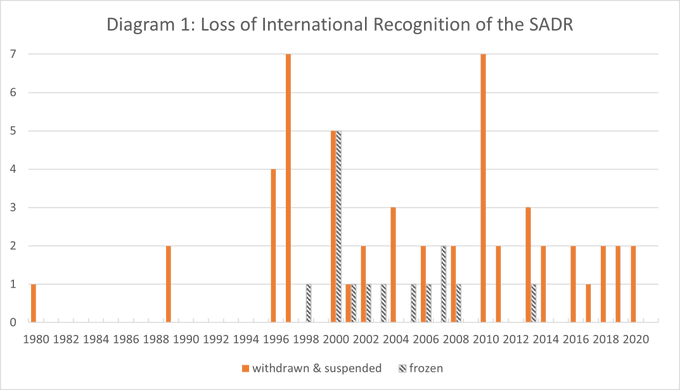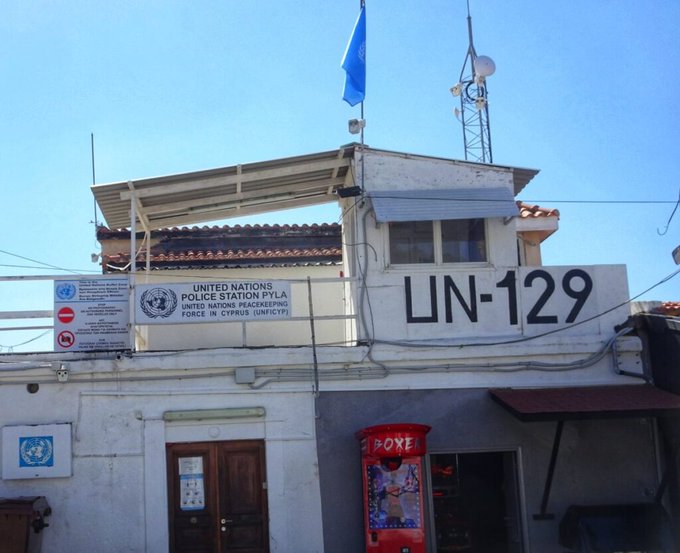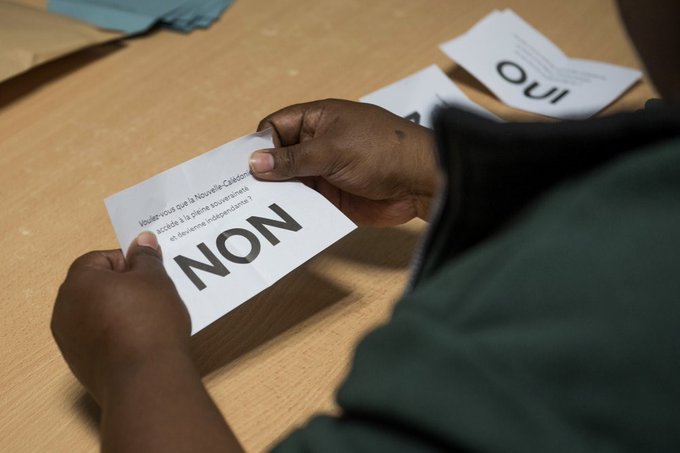Looking into Complex Regional Dynamics of Iraqi Kurdistan
Iraqi Kurdistan is a complicated place. We cannot drink the tap water, women cannot walk down the street alone without being harassed, but if you want to look like Kim Kardashian you are free to inject fillers into your face, or practically any other place you feel necessary, and take endless amounts of selfies pouting with your e-cigarettes and new iPhone to enhance your online presence. The aforementioned, include unpleasantries, and there are dimensions of this place socially, I’d love to see change. There are also really inspiring aspects of living in Iraqi Kurdistan. As an expat mother to a toddler, with a limited social network (initially), I felt embraced by the community in Iraqi Kurdistan.
However, my fascination with Kurds was not initially social, but rather political. When I was in the US Army, we had a name for people like me – ‘Kurdophiles.’ I’ve always been impressed by the Kurdish struggle, sometimes this struggle seems to be a struggle for existence, like when the Syrian Kurds fought against the Islamic State during the occupation of Kobani in 2014. Other times the Kurdish struggle is one of ‘self-determination’ for example, when the Kurdish Referendum for Independence occurred in 2017. Arguably, the Kurdish survival and self-determination have always existed in parallel – this blogpost aims to share my own personal experiences, observations and curiosities.
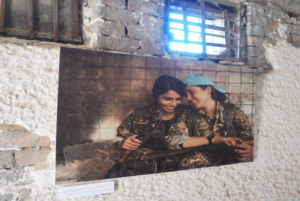
Image: Amna Suraka (Red Prison) in Sulaymaniyah, Iraq, is a former torture prison of Saddam Regime which was converted into an art museum; a photo taken at an exhibition by Joey L. who captured scenes from Rojava during the Syrian Kurdish fight against the Islamic State. (Source: Kimberly Metcalf)
A legacy of betrayal
One of the first components of Kurdish indoctrination, besides the Tambur (a small stringed musical instrument) of course, is that Kurds have ‘no friends, but the mountains,’ this is the famous Kurdish proverb used to characterize the relationship between the Kurds and the world around them. The Kurdish people were subjected to a geography of division at the hands of the empires throughout history, to include the Ottoman and Persian Empires, but it was not until post-World War I, when the lines of the Middle East were redrawn to create modern states under the French and British influence through the Sykes-Picot Treaty that the current struggles of self-determination would take form.
The Kurds form a distinct ethnic group who speak an Indo-European language – Kurdish with two main dialects: Sorani and Kurmanji. The Kurdish population is divided across four major states: Turkey, Iraq, Iran and Syria, making them minorities in each state. The history of the Iraqi Kurds includes multiple rebellions and genocides against the Kurds, such as Saddam’s Halabja attacks in 1988. There are also worthy rabbit holes to travel down such as the establishment of the Mahabad Republic, established in 1946 as the first democratic Kurdish de-facto state, in Iran by Qazi Muhammed, and supported by the Soviet Union. In recent history, the establishment of Rojava – and Autonomous Area of Northeast Syria where the Syrian Kurds claimed to achieve a socialist democratic revolution complete with co-gendered and multi-ethnicity built into the governance model, surrounded by the Syrian civil war deserves attention.
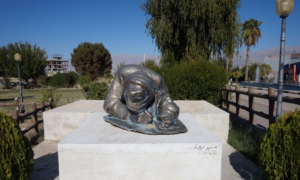
Image: A memorial to the victims of Halabja, when the Saddam Regime, targeted an entire population with Sarin gas and killed upwards of 5000 civilians almost instantly, and crippled another 7,000 -10,000, mostly women and children (Source: Kimberly Metcalf).
The Iraqi Kurdish fight for survival and self-determination is a long-waged war. While in many cases the US has been the biggest ally of Kurds it is often one of the biggest sources of betrayal. Despite the lack of strategic commitment of the US political goals, the tactical commitment between the US and the Iraqi Kurds has been more present than absent throughout decades of US involvement in war in the Middle East. While the US supports integrity of Iraq and not a Balkanization of its territory, the US is willing to overlook the Kurdish Iraqi quest to transition their semi-autonomy to sovereignty.
This is because the Iraqi Kurds are a useful tactical security partner to the US. However, strategically the US is not ready to support a complete de jure separation of Erbil and Baghdad. A complete separation from Baghdad would most likely lead to increased outbreaks of violence (especially in the “disputed areas,” as did the 2017 Kurdish Independence Referendum in an already volatile space). I assess the crux of the US-Iraqi Kurdish relationship to be collaboration on security issues, and the tension of the US-Iraqi Kurdish relationship to be political agendas. The relationship between the US and the Kurds is complicated, but this is less because of gross mismanagement in Iraq, and rather because of a complex context.
Complex relations
What if there was some kind of story that would serve as a vehicle and allow me to illuminate some of the realities of Iraqi Kurdistan and perhaps touch on some key dynamics? No doubt, I am still left with discussing the relationship with Baghdad, oil revenues, budget issues, the disputed areas, the Islamic State, Iranian Incursions, the Turkish Incursion, and this is merely the current situation. It is my assessment that security remains a key issue that is intertwined within the US – Iraqi Kurdish relationship. The Counter- Islamic State Coalition operates out of Erbil, co-located with the KRG capital in Erbil. As the US and other Coalition partners legally justify their budget and their presence in Iraq under the banner of “Operation Inherent Resolve” (the Counter-Islamic State) mission, they have been playing a delicate game with their NATO ally – Turkey, of trying to de-escalate tensions between Turkey and the Kurdistan Workers Party, commonly referred to as the PKK. I can imagine it is very uncomfortable to be working and partnering in Iraqi Kurdistan when your NATO ally is conducting airstrikes within the territory of your security partner in Syria (Rojava).
Think about it – the PKK is a designated terrorist organization. The PKK operates in Turkey and has set off bombs and caused mass casualties on Turkish soil. However, the PKK takes safe haven in the mountains of Eastern Iraq Kurdistan in – Qandil. I will never forget meeting with families in Kobani, Syria when an elderly couple proudly bestowed a framed photo on their wall of a beautiful woman dressed in the green garb of a traditional Kurdish fighter and explained that it was her daughter, training in Qandil, and somewhere (be it training in Qandil or conducting operations in Turkey) she sacrificed her life for the Kurdish cause. The Kurdish Regional Government (KRG) tries to distance themselves from the PKK, but there are many Kurds who feel deeply connected to the PKK. This connection is justified, the PKK is the Kurdish freedom fighter. Whether you agree with violent resistance tactics or not, the cause of self-governance is convincing.
The ruling political party of the KRG, seated in Erbil – the Kurdistan Democratic Party (KDP) led by the Barzani family, distance themselves from the PKK, perhaps for practical reasons such as economics. The not so dirty little secret in the KRG is that food and many household items come from Turkey. When the US withdrew (partially) from Syria in the fall of 2019, and Turkey launched subsequent military operations into Northeast Syria some Iraqi Kurds called for a boycott of Turkish goods. While some Kurds attempted to participate in this non-violent resistance tactic, their effort excluded them from restaurants, hotels, local businesses and from access to many consumer goods. As tense as the relationship between the Kurds and the Turks are, the Turks are deeply embedded into the Iraqi Kurdistan and specifically, Erbil’s economy. For example, when I was at a Holland Bazaar (Grocery store) and sought to buy a narghile (water pipe/shisha/hookah) a woman grabbed me and almost hissed “don’t buy it here, go to the Ainkawa, you will find it on the street for 15,000 dinars,” I became instantly curious about this mysterious woman helping a stranger in the market. I asked where she was from, and she said Turkey, that her husband is Turkish, and the general manager of a bank in Erbil. Like anyone hospitable person in the region projecting their “wasta” (influence or social currency in Arabic), she immediately assured me that if I need anything, just march into the bank, find her husband, tell him that I am her friend and he will take care of it.
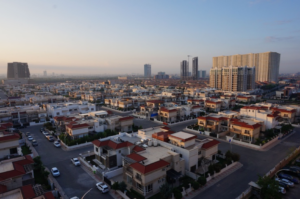
Image: Sunrise over towers and villas in Erbil. (Source: Kimberly Metcalf)
So, now it’s clear, the Kurds and the Turks have a lot of strife between them, but they also, at least economically, co-exist in places like Erbil. Therefore, when the US steps in between their NATO Ally – Turkey (think Black Sea access + Central Asia influence) and the Iraqi Kurds (think security partners against Islamic State), essentially, the US is stepping into a high voltage spider web – a myriad of historical, regional, political, cultural and economic dynamics, that the US will never be able to resolve, nor should they. When I was in Syria working with the Syrian Kurds and horrified at the prospect of our NATO ally entering Syria and slaughtering my Kurdish partners, but I was constantly reminded – “NATO ally vs. tactical partner.” For years, we (the US) predominantly chose our tactical partner in the fight against the Islamic State, but in the fall of 2019, Trump made a relationally devastating decision to withdraw from Northeast Syria, and while some US troops actually do remain in NE Syria, the struggle to regain trust also lingers. The US relationship with the Iraqi Kurds is more extensive than their relationship with the Syrian Kurds, but both relationships can be characterized by controversial and sometime tenuous links which ebb and flows between “partner” and “traitor.”
A surprise delegation to Qandil
After nearly two months of Turkish airstrikes and artillery (beginning mid-June 2020) within the borders of Iraqi Kurdistan governorates, in order to strike PKK targets, I found it peculiar to read a story about the US sending a delegation to Qandil, the heart of the PKK – a place the US tends to avoids overt involvement with. Then, I found it even more peculiar that it was subsequently denied. The contradicting media reports began circulating on August 2nd, 2020 on Iraqi Facebook and Twitter accounts, as detailed by this story in Al Monitor. A source from a local media outlet claimed that a US delegation traveled to Qandil, and US aircraft provided overhead protection. Following this report, US officials denied any kind of meetings with PKK leadership in Qandil. Following these denials from the US, the script switched, and instead of the US visiting Qandil to discuss issues with Turkey or in Northeast Syria, but rather that a Canadian team visited Qandil in order to look for missing children.
Allegedly, the reason behind the Canadian visit to Qandil was to find information about Dr. Sareen Azar (Salahadeen Mahmoud Azar) who is accused of kidnapping his four Canadian children in 2015 and taking them to Qandil. I have not found any official press releases from the Canadian government on the matter, but as I began to dig into the story, I discovered the kernel of truth that is often buried in bizarre miscommunications like this, was popping into a much different story. The story is that the four Canadian children kidnapped by the Kurdish father from their Canadian mother into the stronghold of an armed non-state actor seems to be going unnoticed and unresolved despite campaigns launched by the Canadian mother which reached the desk of Canadian PM Trudeau. A National Post (2016) story and The Globe and Mail (2019) shed more light on the Dr. Sareen Azar story and his move from Canada to Iraq and Iranian Kurdistan, but ultimately this is kidnapping and now the children are perhaps with their father in the mountains of Eastern Iraqi Kurdistan or Iranian Kurdistan.
The kidnapping of the Canadian children illuminates a few important dimensions of Kurdistan writ large, it is a network of humans who have strong social bonds, many of them are armed and they – in modern times represent something akin to a partisan network capable of hiding an entire family in the mountains of Eastern Iraq and Western Iran. I think this leads us to another point; while there are always forms of law, whether informal social rules or codified in constitutions, there is a significant amount of extrajudicial activity and illicit networks that operate in Iraqi Kurdistan. This is unsurprising given the space has existed for so long between threats from Baghdad, Turkey and Iran, as well as in states of rebellion, and internal strife between the PUK and KDP which manifested into a Kurdish Civil War that plagued the region in the mid-1990s.
A few thoughts come to mind, when thinking about the alleged Qandil delegation. It is completely possible that a team or delegation from Canada went to look for the Canadian children. It is within the norms of a Western state’s recovery assets to search for hostages and missing people. The US for instance often publicizes hostage rescue attempts in the aftermath. Alternatively, it is also completely viable theory that searching for the children was merely a cover for a meeting between an element of the Counter-Islamic State Coalition and the PKK. I don’t know what the agenda would be, but perhaps the US or Canada is facilitating a negotiation between the PKK and Turkey, and the latter has some demands for the PKK, in order to achieve a cessation of Turkish hostilities in Iraqi Kurdistan.
The US appears to be committed to maintaining their presence in the Middle East and finishing the fight against the Islamic State, while also keeping their eye on larger strategic matters such as countering Iranian influence. In order to pursue the aforementioned ends, presence and relations in Iraq are necessary. After withdrawing troops from various locations across Iraq, now, Iraqi Kurdistan is one of the most likely basing locations for continued military presence. However, US security operations become stressed if Turkey is constantly conducting cross border operations and provoking US security partners. Therefore, from the US position it seems logical to negotiate between Turkey and the PKK to reach a ceasefire.
Status quo for now
It is my assessment that the US, and to speak more broadly “the West” is committed to Kurdistan. The challenge in Iraqi Kurdistan is that the US partners with Iraqi Kurdistan as security partners, Kurdistan also attracts foreign direct investment through oil and gas, and international non-governmental organizations conduct work in Iraq as well as base in Iraq to access Syria. It is useful for a plethora of international state and non-state actors to operate or base out of Erbil. The problem with this is the duality of systems at play. State and non-state actors who operate under the guise of democratic principles and human rights often subject themselves to and cooperated with a system in Iraq which does not offer the same liberties to their own citizens. The Barzani(s) (KDP) and Talabani(s) (PUK) are the ruling families of the lead political parties of the Iraqi Kurdistan and they do not only suffer from strife with each other, but their citizens are growing increasingly weary on what some perceive as kleptocratic practices.
In order to increase resiliencies, the two political parties need to cooperate and stop undermining each other. Reportedly, there are efforts in progress now to normalize the PUK and KDP relations, without these efforts the future will certainly be strained. Furthermore, relations with Baghdad must normalize as well. The reality is, the Iraqi Kurdistan is not in a position to depart from Baghdad now, and the disputed areas will not come under the control of Kurds without a fight. The plan in place for Joint Coordination Cells between the Ministry of the Peshmerga and the Ministry of Defense is the best possible approach. The integration of the Iraqi Security Forces and the Peshmerga keeps the fight focused on a common enemy – the Islamic State and theoretically, this collective effort can alleviate political disagreements manifesting into physical conflict between Baghdad and Erbil.
Furthermore, Kurds can expect that their neighbors to the North are not growing tired of airstrikes within Iraqi territory and that they are becoming more brazen. While ordinary Kurds might say they reject the PKK, it is my assessment that they are revered, and that the continued Turkish military operations in the Kurdistan region of Iraq leads Kurdish people to question their own leadership. In fact, it seems to confirm their suspicion that the KDP is double dealing with Turkey, allowing them to operate lucrative businesses in Erbil and handing over the PKK to a country which doesn’t see the Kurdish nation worthy of a state. The duplicitous relationship with Turkey and their own people is bound to backfire.
Finally, there is Iran which will continue to divide and conquer through their militias and associated political ties. It is in the interest for the PUK and KDP at odds, so we can expect to see friends of Iran to support opposition elements and parties in order to keep the KDP and PUK as well as the KRG and Baghdad – in tension. When Turkey initiated a ground and air campaign in mid-June in Iraqi Kurdistan, Iran took their chance to bomb the PJAK (Kurdish Iranian Opposition militant group) in Iraq. Ultimately, Iran seeks a weaker Iraq, thus, strain in the relationship between the Kurds and Baghdad helps reach this end state.
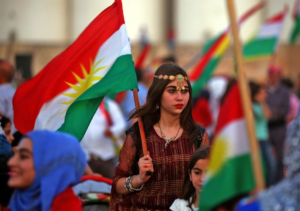
Image: Kurds in Rojava turn out on September 26, 2017 to support the independence referendum in Iraqi Kurdistan. (Source: AFP/Getty Images).
As for the Kurds, it seems no one really wants them to emerge as an independent state, for now. On one hand, to exist in Iraqi Kurdistan includes the possibility of living quite a glamourous life amongst the Turks, Lebanese, Iranians and other expats who occupy Erbil, or to live more austerely on the fringes of Erbil, or across the five governorates. Unlike some de facto states isolated from the rest of the world, Iraqi Kurdistan is well connected and agile with their business development. While the security threats to the region produce high levels of anxiety, there is also a certain element of anarchy which offers a kind of opportunity. However, this is not without consequence, as I stated above, the Kurdistan Regional Government (KRG) has a lot of work to do in order to improve the business and security environment for their own citizens as well as foreigners who want to invest. What is predictable is that the US will remain a security partner in Iraqi Kurdistan and negotiations between the KRG, Baghdad, Turkey and Iran will continue to shape this space as well.
Author: Kimberly Metcalf


